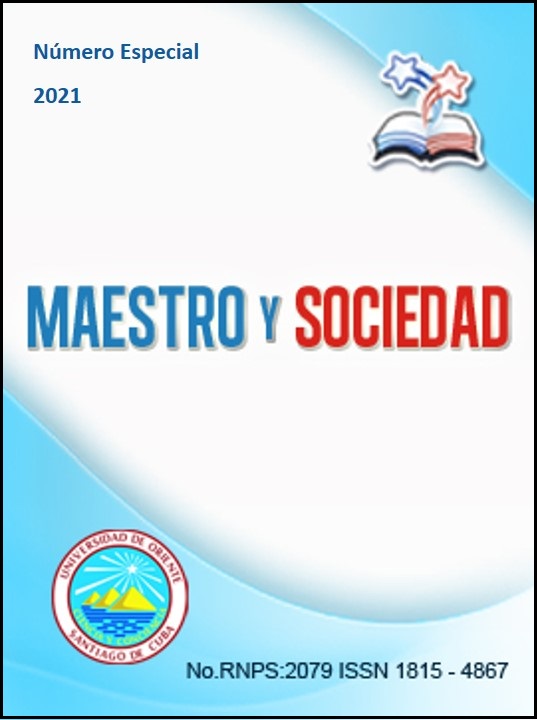Array Array
Array
Palavras-chave:
Array, ArrayResumo
ArrayReferências
2. AntonaKis, J., & House, R. J. (2014). Instrumental leadership: Measurement and extension of transformational–transactional leadership theory. The Leadership Quarterly, 25(4), 746-771.
3. Aydin, A., Sarier, Y., & Uysal, S. (2013). The Effect of School Principals’ Leader-ship Styles on Teachers’ Organizational Commitment and Job Satisfaction. Educational sciences: Theory and practice, 13(2), 806-811.
4. Bass, B. M., & avoLio, B. J. (1994). Transformational leadership and organizational culture. The International Journal of Public Administration, 17(3-4), 541-554.
5. CHen, A. S. Y., bian, M. D., & Hou, Y. H. (2015). Impact of transformational leadership on subordinate’s EI and work performance. Personnel Review, 44(4).
6. Deroncele Acosta, A., Gross Tur, R., & Medina Zuta, P. (2021). El mapeo epistémico: herramienta esencial en la práctica investigativa. Universidad Y Sociedad, 13(3), 172-188. Recuperado de: https://rus.ucf.edu.cu/index.php/rus/article/view/2088
7. Deroncele, A. (2020). Competencia epistémica del investigador. En A. M. de Vicente Domínguez y N. Abuín Vences (Coords), LA COMUNICACIÓN ESPECIALIZADA DEL SIGLO XXI (pp. 53-77). Madrid, España: McGraw-Hill. ISBN: ISBN: 978-84-486-2434-7. https://bit.ly/3ANOsWw
8. Deroncele, A. (2020). Paradigmas de investigación científica. Abordaje desde la competencia epistémica del investigador. Revista Arrancada, 20(37), 211-225. https://revistarrancada.cujae.edu.cu/index.php/arrancada/article/view/331/233
9. Deroncele, A., Del Toro, M., y López, R. (2016). Método formativo de la práctica profesional del psicólogo. Revista Opuntia Brava. 8(3), 1-12. Recuperado de: http://opuntiabrava.ult.edu.cu/index.php/opuntiabrava/article/view/265/260
10. Deroncele, A., Nagamine, M., y Medina, D. (2020). Bases epistemológicas y metodológicas para el abordaje del pensamiento crítico en la educación peruana. Revista Inclusiones, 7(Número Especial), 68-87.
11. Deroncele, A., Nagamine, M., y Medina, D. (2020). Desarrollo del pensamiento crítico. Revista Maestro y Sociedad, 17(3), 532-546.
12. Ewen, C., wiHLer, A., bLicKLe, G., oerder, K., eLLen, B. P., dougLas, C., & fer- ris, G. R. (2013). Further specification of the leader political skill–leadership effectiveness relationships: Transformational and transactional leader behavior as mediators. The Leadership Quarterly, 24(4), 516-533.
13. Grissom, J. A., & Loeb, S. (2011). Triangulating principal effectiveness how perspectives of parents, teachers, and assistant principals identify the central importance of managerial skills. American Educational Research Journal, 48(5), 1091-1123.
14. HambricK, D. C. & Mason, P. A. (1984). Upper echelons: The organization as a reflection of its top managers. Academy of management review, 9(2), 193-206.
15. Kinchington, F. (2019). Critical thinking in leadership: Leading change in complex contexts. International Perspectives on Leadership in Higher Education: Critical Thinking for Global Challenges (Book Chapter), 31-43, doi: 10.4324/9781315122410-4
16. Ledo, C., y Deroncele, A. (2017). El diplomado de Educación Superior para jóvenes docentes y su impacto en los procesos universitarios. Revista Didasc@lia: Didáctica y Educación, 8(7), 1-10. https://refcale.uleam.edu.ec/index.php/didascalia/article/view/1833
17. Mendoza, M. R., Ortiz, C. (2006). El Liderazgo Transformacional, Dimensiones e Impacto en la Cultura Organizacional y Eficacia de las Empresas. Revista Facultad de Ciencias Económicas: Investigación y Reflexión, XIV(1), 118-134. https://www.redalyc.org/pdf/909/90900107.pdf
18. Pedraja-Rejas, L., Rodríguez-Ponce, E., Barreda, M., Sagredo, O., & Segovia, C. (2009). Estilos de liderazgo y resultados del sistema de medición de la calidad de la educación: un estudio empírico en los colegios básicos de la ciudad de Arica-Chile. Ingeniare. Revista chilena de ingeniería, 17(1), 21-26.
19. Powley, E. H., Taylor, S.N. (2014). Pedagogical Approaches to Develop Critical Thinking and Crisis Leadership. Journal of Management Education, 38(4), 560-585, doi: 10.1177/1052562913519081
20. Tardo, Y., Fernández, Y. & Deroncele, A. (2019). Gestión para la evaluación del impacto formativo de las investigaciones educativas. Revista Inclusiones, 6(3), 46-62. http://revistainclusiones.org/index.php/inclu/article/view/70
21. Ten-Bruggencate, G., Luyten, H., Scheerens, J. & sLeegers, P. (2012). Modeling the Influence of School Leaders on Student Achievement How Can School Leaders Make a Difference? Educational Administration Quarterly, 48(4), 699-732.
22. Valentine, J. W. & Prater, M. (2011). Instructional, transformational, and managerial leadership and student achievement: High school principals make a difference. NASSP Bulletin.
23. Werner, S.H., Bleich, M.R. (2017). Critical thinking as a leadership attribute. Journal of Continuing Education in Nursing, 48(1), 9-11, doi: 10.3928/00220124-20170110-03
24. Yang, M. L. (2012). Transformational leadership and Taiwanese public relations practitioners’ job satisfaction and organizational commitment. Social Behavior and Personality: an international journal, 40(1), 31-46.
Publicado
Como Citar
Edição
Seção
Licença
Esta revista proporciona un acceso abierto inmediato a su contenido, basado en el principio de que ofrecer al público un acceso libre a las investigaciones ayuda a un mayor intercambio global de conocimiento. Cada autor es responsable del contenido de cada uno de sus artículos. Los artículos pueden ser inéditos o estar disponibles previamente en servidores de preprints reconocidos por la revista. Sin embargo, no se permite la duplicación de la publicación o traducción de un artículo ya publicado en otra revista o como capítulo de un libro.
This journal provides immediate open access to its content, based on the principle that providing the public with free access to research supports a greater global exchange of knowledge. Each author is responsible for the content of each of their articles. Articles may be previously unpublished or available on preprint servers recognized by the journal. However, duplication of publication or translation of an article already published in another journal or as a book chapter is not permitted.
Esta revista oferece acesso aberto imediato ao seu conteúdo, com base no princípio de que oferecer ao público acesso gratuito à pesquisa contribui para um maior intercâmbio global de conhecimento. Cada autor é responsável pelo conteúdo de cada um de seus artigos. Os artigos poderão ser inéditos ou estar previamente disponíveis em servidores de preprints reconhecidos pela revista. No entanto, não é permitida a duplicação de publicação ou tradução de artigo já publicado em outro periódico ou como capítulo de livro.



























 Universidad de Oriente
Universidad de Oriente 